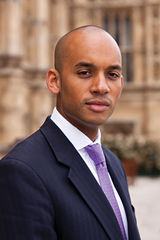Winning the global race
 Shadow Business Secretary Chuka Umunna shares his views on the economy, education and the state of society with Peter Cheney. The senior Labour MP, with Irish roots, is seen as ‘one to watch’ at Westminster.
Shadow Business Secretary Chuka Umunna shares his views on the economy, education and the state of society with Peter Cheney. The senior Labour MP, with Irish roots, is seen as ‘one to watch’ at Westminster.
After less than three years in Parliament, Shadow Business Secretary Chuka Umunna is being tipped for greater things to come. Some commentators see him as a future resident of Number 10 and he would be highly likely to enter the Cabinet if Labour returned to power.
Aged 34, he is the son of a Nigerian father and an Anglo-Irish mother, and has relatives in Donegal. agendaNi met him on a walkabout in Bangor with Shadow Northern Ireland Secretary Vernon Coaker.
Umunna sees the UK as being in a “global race” to succeed in the 21st century economy: a theme often taken up by David Cameron and Theresa Villiers.
Britain, he explains, has a competitive edge in aerospace, the automotive industry, food and drink, bio-technology, pharmaceuticals and the creative industries. That position needs to be maintained and grown to “meet demand from the south and the east” i.e. the BRIC economies.
“We’ve also got to identify what will be the new sectors of the future,” he comments. “We’ve got to have government and the private sector working in partnership to actually make the UK’s success in the global race a reality.” It cannot be entirely left to the market.
Umunna’s main criticism of Cameron is that he talks about the end without working on the means to make it happen; that represents “talk for nothing.” The Prime Minister led a major trade mission to India in February but Umunna contends that the Government’s immigration policy has deterred talented Indian students from coming to the UK.
“Look, I think it’s good that he’s led a trade mission,” he continues, “but what we actually need is a proper industrial strategy implemented across the board and in respect of the particular sectors which are going to give us that edge.”
His visit to Bangor came after an invitation by the Northern Ireland Independent Retail Trade Association and he is clearly impressed with the town centre.
“If you look where we’re standing here,” he says as he stops in High Street, “there is not one chain store that I can see in front of us and there’s an utter determination amongst the businesses that we’ve just spoken to to ensure that small, local independent shops continue to thrive and add to the distinctive character of the area.”
This contrasts with the main thoroughfare in his own constituency of Streatham, in south London. “People actually have a relationship with the people selling the products,” he points out. “So they get, I think, often a superior level of service.”
However, Umunna also acknowledges how low consumer demand is affecting shops. Streatham has a business improvement district and he sees the business forum in Bangor as a step towards that.
Social conservatives saw the 2011 London riots as confirming the narrative of ‘Broken Britain’. The disorder caused an estimated £200 million in damage and led to 1,500 arrests.
Umunna, though, disagrees that society is broken: “You’ve got to remember that it was a minority of people who were involved in the London riots, it wasn’t a majority.” He asserts that there is no excuse for violence but poses the question: “What was it about their situation that made them feel that they had nothing to lose?”
The “strong arm of the law” needed to come down on those responsible but he sees an equal need to put opportunities for young people in place.
“We’ve been talking about non-academic and technical routes to furthering your own skills,” he continues. “If we’re not providing that on a sufficient scale for people who are not academic, then you increase the risk that they are going to feel there’s nothing out there for them.”
Umunna went to a private secondary school but sits on the left of the party. He is a member of the Compass think tank, a counter-weight to the Blairite Progress group. As for his main ambition, he is looking ahead to the next general election.
“The biggest frustration for Vernon and I is that it’s no fun being in the shadows, that all we can do is say,” Umunna states. “We can’t actually do, so it’s absolutely imperative that we get back into power so that we can make our social democratic Labour politics a reality.”
Pressed for why he entered politics, he quips: “To change the world.” Many politicians have said that but he adds: “That’s why you do it. The world starts on your doorstep.” As an employment lawyer, he was “deeply frustrated” when advising people “on laws that I hadn’t really a role in making” and also by taking instructions from large multi-nationals.
“For all the knocks that politics gets, you can still effect massive, massive positive change impacting on millions of people,” he states. Umunna sees his role as an MP as an “immense privilege” as having the opportunity to make a difference to people’s lives is “priceless.”
Profile: Chuka Umunna
Chuka grew up in Streatham and has represented the constituency since the 2010 general election. He studied law at the University of Manchester, the University of Burgundy and Nottingham Law School. Chuka was DJ as a teenager and a student, and still follows house music as well as going to the gym. He was taught by Anthony Seldon, the biographer of Blair and Brown. He was appointed Shadow Business Secretary in October 2011 and his political interests include cover the economy, education, justice, climate change and communities.





